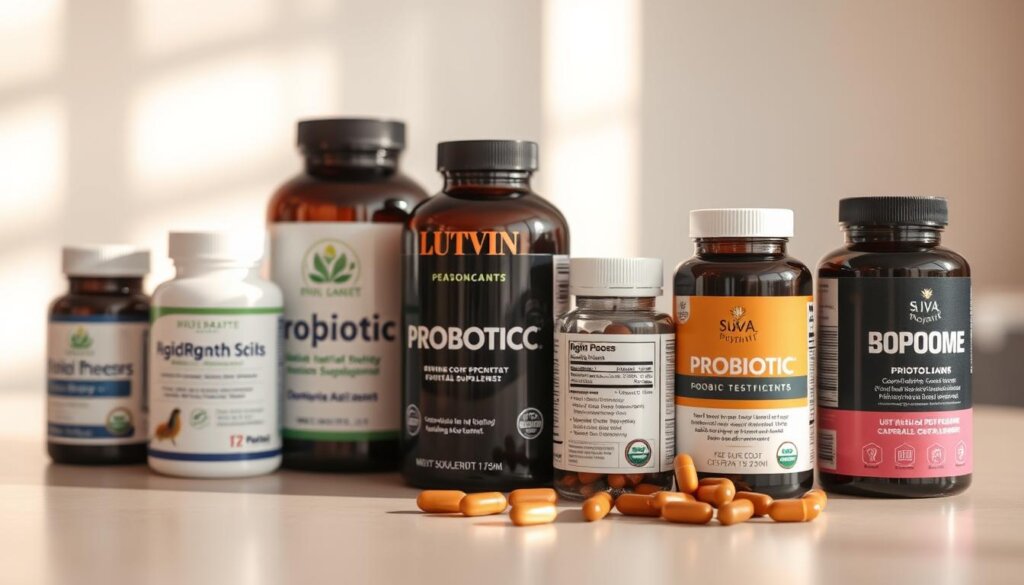Why Do You Need Probiotics? Get the Facts
What if the key to better health isn’t just what you eat, but what’s already inside you? Trillions of microorganisms inhabit the human body, forming a hidden ecosystem that influences everything from digestion to mental clarity. These tiny allies—particularly probiotics—play a critical role in maintaining balance within the gut microbiome, a complex network that supports immunity, metabolism, and overall wellness.
Modern lifestyles often disrupt this delicate microbial harmony. Processed foods, stress, and environmental factors can tip the scales toward harmful bacteria. Probiotics act as reinforcements, crowding out undesirable microbes while enhancing nutrient absorption and vitamin production. Research shows they may even help reduce inflammation and regulate bowel movements, making them vital for those seeking sustainable health improvements.
But probiotics aren’t a one-size-fits-all solution. Their effectiveness depends on strain diversity, dosage, and individual needs. This guide breaks down how these microorganisms interact with bodily systems, their science-backed benefits, and practical ways to integrate them into daily routines. Whether optimizing digestion or strengthening the immune system, understanding probiotics unlocks new pathways to holistic wellness.
Key Takeaways
- The gut microbiome impacts physical and mental health through digestion, immunity, and nutrient synthesis.
- Probiotics help restore microbial balance disrupted by modern diets and stressors.
- Specific strains target different health concerns, from inflammation to vitamin production.
- Regular use may support bowel regularity and strengthen immune responses.
- Quality matters: effective products require research into strains and CFU counts.
Probiotics 101: Understanding What They Are
Imagine microscopic warriors working 24/7 to keep your body balanced. Probiotics are live microorganisms that act as natural allies, maintaining harmony in your gut and beyond. These beneficial bacteria thrive in fermented foods and supplements, supporting critical bodily functions.
Definition and Core Concepts
At their core, probiotics are living microbes that strengthen your body’s defenses. Two key groups dominate this category: Lactobacillus species like acidophilus and rhamnosus excel in breaking down food, while Bifidobacterium strains boost immunity. They naturally inhabit mucous membranes from the digestive tract to the urinary system.
These microorganisms create protective barriers against harmful pathogens. Think of them as gardeners tending your internal ecosystem—crowding out weeds while nurturing healthy growth. A balanced microbiome supports nutrient absorption and vitamin production, as detailed in this guide to probiotic benefits.
Types and Common Sources
Probiotics come in diverse forms tailored to different needs:
- Fermented foods: Yogurt, kimchi, and kefir contain live cultures developed through traditional preparation methods
- Supplements: Capsules or powders offer concentrated doses of specific strains like Bifidobacterium breve
- Beverages: Kombucha and certain dairy drinks provide liquid-based options
Quality varies significantly between sources. For instance, pasteurized sauerkraut loses its active cultures, while refrigerated supplements often maintain potency better than shelf-stable versions. Always check labels for strain specificity and colony-forming units (CFUs).
Health Benefits of Probiotics for Gut and Overall Wellness
Your body’s microbial allies work tirelessly to maintain equilibrium between systems. Probiotics deliver measurable advantages for both digestive efficiency and immune resilience, with research confirming their role in managing common health challenges across age groups.

Supporting Digestive Health
Clinical trials highlight probiotics’ ability to ease antibiotic-related diarrhea by 35-50%. They restore microbial balance disrupted by medications or stress, easing bloating and irregularity. Specific strains like Lactobacillus rhamnosus show particular effectiveness against IBS discomfort.
These beneficial bacteria strengthen intestinal barriers, preventing harmful pathogens from entering the bloodstream. This action reduces inflammation linked to chronic gut issues. Regular use may also improve nutrient absorption from foods.
Boosting the Immune System
Nearly 70% of immune cells reside in the gut. Probiotics enhance their activity by stimulating antibody production and crowding out harmful microbes. Studies indicate 20% fewer respiratory infections in adults taking daily supplements.
For children, specific strains lower eczema risks by 40% in high-risk infants. Hospitalized patients using probiotics experience fewer post-treatment infections. This microbial support proves especially valuable during seasonal illness peaks or recovery periods.
Why Do You Need Probiotics?
Everyday habits shape more than routines—they influence the unseen world within your gut. Processed meals, chronic stress, and environmental pollutants constantly challenge microbial harmony. This ongoing pressure creates a need for targeted support to maintain equilibrium.
Addressing Digestive Imbalances
Bloating, irregularity, or food sensitivities often signal a struggling microbiome. Antibiotics amplify these issues by wiping out both harmful and beneficial bacteria. Taking probiotics helps repopulate the gut with friendly microbes, particularly after medical treatments.
Those with demanding lifestyles—frequent travelers or athletes—face higher risks of digestive discomfort. A depleted microbiome struggles to process nutrients efficiently. Restoring balance becomes crucial for preventing long-term gut health complications.
Enhancing Daily Health and Wellbeing
As natural probiotic levels decline with age, supplementation supports immune resilience and nutrient absorption. Research shows people maintaining daily probiotic routines often report better energy levels and mood stability.
Beyond physical health, these microorganisms influence sleep quality and stress responses. Urban dwellers and those exposed to pollution benefit from their protective effects. Think of probiotics as partners in building sustainable wellness—one balanced day at a time.
How to Choose the Right Probiotic Supplement
Navigating the probiotic aisle can feel overwhelming, with countless options promising gut health miracles. Not all products deliver results—some lack viable strains or sufficient colony-forming units (CFUs) to make an impact. Smart selection starts with understanding what separates effective probiotic supplements from marketing hype.

Evaluating Strain Effectiveness and Safety
Start by matching strains to your health goals. Lactobacillus acidophilus supports digestion, while Bifidobacterium longum may reduce inflammation. Check labels for research-backed strains and CFU counts between 1-10 billion for daily use. Reputable brands provide expiration dates and storage guidelines to ensure live cultures survive.
Since dietary supplements aren’t FDA-regulated, third-party certifications like NSF or USP verify quality. Look for products tested for contaminants and accurate labeling. Avoid formulas with unnecessary additives—simpler ingredient lists often mean better absorption.
Consulting a doctor helps personalize choices, especially for those managing chronic conditions or taking medications. They can recommend strains proven effective through clinical trials. As one gastroenterologist notes: “Probiotic benefits depend on strain specificity and delivery methods that protect microbes from stomach acid.”
Compare cost based on viable CFUs per dose rather than bottle price. Refrigerated options often maintain potency better in Malaysia’s tropical climate. Prioritize transparency—trustworthy brands share detailed manufacturing practices and strain origins.
Practical Tips for Incorporating Probiotics into Your Diet
Building a thriving gut ecosystem starts with everyday choices. Simple adjustments to meals and routines can amplify microbial diversity while supporting long-term wellness.
Probiotic Foods and Fermented Alternatives
Fermented foods offer flavorful ways to boost microbial intake. Yogurt with live cultures, kimchi, and kombucha provide natural probiotics. Check labels for “live and active cultures”—pasteurization often destroys these beneficial microbes.
Diverse options suit different palates: tangy sauerkraut pairs well with sandwiches, while creamy kefir works in smoothies. Traditional miso soup and unpasteurized pickles add variety to meals. These food sources deliver probiotics alongside essential nutrients.
Wellness Group Support and Consultation
Personalized guidance ensures optimal results. The Wellness Group helps create tailored plans combining pre-probiotic capsules with dietary strategies. Reach their experts via WhatsApp at +60123822655 (Monday-Friday 9:30am-6:30pm, Saturday 10am-5pm).
Lifestyle Adjustments for a Healthy Gut Microbiome
Support your gut microbiome with these habits:
- Combine probiotic-rich foods with prebiotic fibers from oats, bananas, and asparagus
- Limit ultra-processed snacks and artificial sweeteners
- Maintain 8-hour nighttime fasting periods
- Space meals 3-4 hours apart for better digestion
Reduce unnecessary antibiotics use and manage stress through meditation or light exercise. These changes create an environment where beneficial bacteria flourish naturally.
Conclusion
Maintaining a balanced gut ecosystem proves essential for overall health and disease prevention. Probiotics—living microorganisms that support the digestive system—help achieve this equilibrium through targeted microbial reinforcement.
Scientific research confirms their role in strengthening immune responses and reducing risks of gastrointestinal conditions. While temporary bloating may occur during adjustment periods, consistent use often leads to improved gut comfort and nutrient absorption.
Success lies in combining supplements with lifestyle strategies. High-quality probiotic-rich foods and refrigerated formulas work best alongside prebiotic fibers. Adults seeking lasting wellness should prioritize strain-specific products matching their unique microbiome needs.
These dietary allies, when used strategically, offer measurable benefits for modern lifestyles. By nurturing beneficial bacteria, they create resilient foundations for both physical and mental vitality.
FAQ
What exactly are probiotics?
Probiotics are live microorganisms, often called “good bacteria,” that support digestive health and immune function. They naturally occur in fermented foods like yogurt, kimchi, and sauerkraut, or can be taken as dietary supplements.
How do probiotics improve gut health?
These beneficial bacteria help balance the gut microbiome, which plays a role in digestion, nutrient absorption, and reducing symptoms like bloating or gas. They also strengthen the intestinal barrier against harmful pathogens.
Can probiotics boost the immune system?
Research suggests probiotics may enhance immune responses by promoting healthy gut bacteria, which interact closely with immune cells. A balanced microbiome helps the body defend against infections and inflammation.
Are there risks to taking probiotic supplements?
While generally safe, some people experience mild side effects like gas or bloating initially. Those with weakened immune systems or serious health conditions should consult a doctor before starting supplements.
What should you look for in a probiotic supplement?
Choose products with well-researched strains, such as Lactobacillus or Bifidobacterium, and check for CFU (colony-forming units) counts. Quality supplements list strain specificity, expiration dates, and storage requirements.
Should probiotics be taken with antibiotics?
Antibiotics can disrupt gut bacteria balance. Taking probiotics during or after a course may reduce digestive issues like diarrhea. However, timing matters—space them at least two hours apart for effectiveness.
Can food sources replace probiotic supplements?
Fermented foods like kefir, miso, and kombucha are excellent natural sources. However, supplements offer higher, targeted doses for specific health needs, such as addressing IBS or immune support.
When should someone consult a professional about probiotics?
If digestive symptoms persist, or for personalized advice on strains and dosages, contact a wellness specialist at +60123822655 during business hours. They can guide lifestyle adjustments for optimal gut health.

Khloe Tan
Khloe Tan is a Certified Nutritionist, Corporate Wellness Trainer, and Holistic Health Specialist with over 15 years of experience in the health and wellness industry. She has delivered more than 100 talks nationwide, inspiring and educating diverse audiences on nutrition, lifestyle, and sustainable wellness. Her work has positively impacted over 3,000 lives, and she continues to champion holistic approaches to well-being in both corporate and personal settings.





